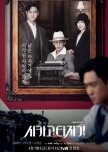
Touching. Exciting. Stylish. Passionate. Atmospherically dense, especially regarding the 1930s
For me, "Chicago Typewriter" needed a second attempt. The first time I didn't really know what to do with it. ...A smart spring chicken, but somehow paranoid writer, spoiled by success and money, and a cute girl as his fan? The story - fancy as it may come along - at first glance appeared a bit all too playfully shallow for my taste. I wasn't convinced. Although I actually really like actor Yoo Ah-in.Actually, I was mainly curious about the past (around 1930 when ´Korea´ was a colony of Japan). One of "Chicago Typewriter"'s two storylines is set in the context of the 1930's Gwangju student movement. With regard to the KDrama´s historical plot line though, it felt like nothing really happened for a long time. Accordingly, when I first had tried to watch "Chicago Typewriter", I didn't make it past the "beginning". However, somehow I kept stumbling across this KDrama and it wouldn't let go off me. Eventually I gave it another try. Lo and behold, with a little patience, the KDrama took me by the hand and developed an exciting story with a lot of passion and atmospheric density, especially when it came to the 1930s. The insight into that time had lasting impressions. Still, the relationship dynamics between the leads especially in the present time story line sometimes were little too light-weight, harmless and on the verge of silliness for my taste. However this was perfectly balanced in the context of their mission in the past and got more profound as the story proceeded.
------------------------- SIDE NOTE: --- Japanese colonialism ---
During the 1930s Japanese imperialism had reached its peak. In relation to Korea, a rigorous policy of assimilation, using force if necessary, was pursued, e.g. the Korean language, culture and history were systematically suppressed as part of a Japanese colonial education. The first Gwangju student movement, which culminated in a nationwide anti-Japan demonstration, happend in November 1929 after a female Korean student having been molested by Japanese students. This attack was certainly not the first, but the Korean student movement had formed in such a way that a large-scale street demonstration in Gwangju spontaneously took place after this incident. The mood swept across the whole country...
-------------------------
As a premise, the KDrama plays with the concepts of reincarnation and the concept of spirits remaining in near-earth realms after their death, until their unresolved past experiences are somehow redeemed. Both are popular motifs that are often picked up in KDramas. In this case, the producers have created a particularly beautiful and profound story, especially with regard to redemption. In 2017, the characters get a second chance, so to speak: they have the choice of whether they want to continue in their familiar pattern or make new decisions. There´s an opportunity to reconcile past guilt or open questions, to let go of the energy that still hangs in the past and to move on in the NOW. This aspect of time jumps is unabashedly and creatively juggled with an undeniable love for details. One of the protagonists, whose spirit since 1930 hasn´t been able to leave the earthly realms, becomes the connecting and driving force that knots both timelines. A special charm: The ghost from back then becomes a "ghostwriter" in 2017 when he meets his reincarnated comrades-in-arms. Another punchline: the title "Chicago Typewriter" is ambiguous, referring both to the typewriter as a "weapon" (with typed words) of the student underground movement, and to the Thompson machine gun - a rapid-fire weapon that was fashionable at the time, its nickname being areference to its characteristic rattling sound when launched.
As the story progresses, the rhythm of the present day being intertwined with the past - in the form of sudden memories or dreams - accelerates. The faster the time jumps, the higher the tension rises. It's actually going to be really dramatic, both in the past AND present...
In sum: the KDrama is giving you a clear idea of living under Japanese colonialism and of the resistance movement that rebelled against it. "Chicago Typewriter" is also a feast for the eyes in terms of fashion and equipment - both 2017 and 1930! "Chicago Typewriter" is first and foremost a moving story about friendship. And not to forget: a touching love story ...
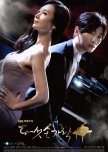
A must-have for makjang-lovers. A roller coaster of evil where you end up feeling for the worst, too
"Five Fingers" is a must-have for all those who love "makjang". A roller coaster of evil... and it doesn't stop. The spectators are allowed to tear their hair, wriggle, turn, annoy themselves to the bitter end... It's about the piano, too - some battles take place while playing, being around and doing business with the grand piano.This is about family and South Korean family values/virtues in particular. Submission to the value system is declined as a virtue in all its fatality. In the interweaving of events, the viewer inevitably faces the question again and again: is it virtue or stupidity, virtue or impertinence, virtue or arrogance?
The series dates from 2012 and makes a cunning attempt to challenge viewers to confront the value system. The rebellious thoughts inevitably arise in the minds of the viewers, because the well-meaning decisions that the protagonists make over and over again drive the values surrounding family (love) to the absurd and trigger suffering one after the other.
The ambivalence inherent in this is exploited perfectly. The actors do their part.
With 30 episodes there may be a tendency to flee in between, but I don't know anyone who didn't stick it out to the end. The ending may not be the classic happy ending, but it may be the true happy ending: the wheel of fortune comes to a standstill. Peace.
At first glance, the greed for money and power seems to be the driving force behind all evil. But actually it is the greed for love and recognition. The wheel of fate and suffering has already been turned on long before the protagonists - the two half-brothers In-ha and Jin-ho - compete against each other. To a certain extent they live out the unresolved conflicts of their parents. If you want to ask who is to blame for everything, then the root goes back a long way. The father pulls the strings out of the grave and it goes even further. A nice psychological study. Especially since you can't help but feel sympathy for everyone, even the worst troublemakers.
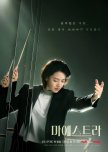
The aura of this series is characterized by the inspiring world of the orchestra and its musicians
Be prepared: "Maestra - Strings of Truth" is impressively led by a highly concentrated Lee Young-ae and set in a refreshingly rare environment for a KDrama. Focusing on one of the very few, but highly talented, globally famous female conductors, the aura of this series is characterized by the inspiring world of the orchestra and its musicians. We also meet management lounges and the luthier´s workshop. Enchantingly, this maestra and her particular orchestral world offer a quite unique and mature flavour of series experience."Maestra - Strings of Truth" lives from the psychological depths and relationship dynamics of the main characters as well as the pathos of the world of classical music. Of course there are also intrigues, love, yearning for revenge and more, but the focus is on the maestra as a person in her struggle with herself, her passion for music and her life challenges.
For the FL, her love for music is at the center of her being and aspirations. As far as the men in her life are concerned, they would rather like things to be different. However, the maestra has a good reason why she has consistently dedicated her time to the orchestral world. And when it comes to her work, she is uncompromising. Above anything else, she is delivering a perfect performance. This is non-negotiable. Some people would prefer that to be different too...
For her role as maestra, Lee Young-ae completed several months of violin and conducting lessons. Her 'first violin', Hwang Bo-reum-byeol, also took eight months of lessons specifically for this purpose. Considering, there's a lot of passion involved in this KDrama, even before filming even started... and you can feel it.
By the way, the idea for the story did not grow on South Korean soil. It is a K-style remake of a French television series that focused on the career struggles of the very few women in this profession. (Only five percent of all conductors worldwide are female...) "Maestra - Strings of Truth" is dramaturgically heated up by a fatal love triangle with collateral damage and an even more fatal family legacy that the maestra would rather do without.
Intensive. Atmospheric. Thrilling, too.
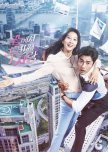
Mature romance, yet balanced with the eternal youth residing in the feeling of falling in love.
"Second to Last Love" is processing the topic 'getting old in South Korea' in a playful, sometimes profound, sometimes tender way. 'Old' means having exceeded 40. An 'Ahjumma' can be a swear word for a South Korean woman. Also ´Ahjussi´ for a man. In German it would probably be comparable if the casual 'Du' among around +/- 30 year old people suddenly became a 'Sie' - then you know: now I've fallen out of the '+/- same age'...In South Korea, a large percentage of life revolves around looking good and looking young. Marriage is also a big topic - wedding photos are always placed accordingly large and dominant in the house or apartment. The family ultimately forms the meaning of life, so to speak, if you follow in the footsteps of tradition. In case you stick to this standard - look good, marry well and take care of an honorable family - then everything is fine. Just one step to the right or left of the path creates social turbulence. Women (and men too) must be prepared and able to stand this. The issue will come up more or less confrontationally on every occasion.
This South Korean peculiarity is the starting point for many a KDrama. In "Second to Last Love" as well. However, this story chooses its own fine style and an almost progressive approach to it. Age and age differences in partnership are brought up again and again in several respects. Likewise, married vs. unmarried. Not only the conservative, but also somewhat more free-spirited perspectives and opinions are interspersed in a refreshingly good mood.
While the female protagonist is a career woman and single, the male protagonist lives as the head of a patchwork family. His wife died long ago, as did her fiancé. (Not that they didn't want a partner...) They've both been living their particular single life-style for decades by now and have gotten used to it. They no longer expect anything to change. This is where the KDrama comes in and tweaks a few dramaturgical adjustments in order to shake them both up and question their lives, their life plans, their longings and decisions. They may be 'old' in the eyes of society, but their lives are far from over. And THAT is the key point! There is still time and space for new decisions, for change, even for a second love in the last half of their life. Apart from aging, "Second to Last Love" is also about taking responsibility for one's own life and one's own decisions, including new ones. Despite all the depth, which it doesn't shy away from, the KDrama also has a touch of humor overall.
The protagonists´ 'grown-up' relationship is so delightfully mature and refreshingly grounded. Kim Hee-ae and Ji Jin-hee embody this adult maturity successfully balanced with the magic of eternal youth that resides in the feeling of falling in love. Their rapprochement, their feelings for each other and their attitude towards the other form a pleasant contrast to the more enthusiastic youthful forms that the protagonists are also confronted with...
The story is embedded in a picturesque, idyllic landscape and also allows a look behind the curtains of KDrama industry. The plot and its difficult issues - 'aging' and 'taking responsibility' - are rounded off by a few secondary plots within the patchwork family and work colleagues. A bit of intrigue should not be missing either. Last but not least, and above all, there is the romance, which despite the obstacle-filled terrain unerringly and sensitively paves the way between the two protagonists...
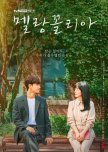
Richly layered. Excellently staged.
"Melancholia" is silently impressive. If you're just looking for a sweet romance, you'll be disappointed. Still, the story is a tribute to love. It's also about school, education, South Korean madness about education and the market around it, the arrogance of the top 10 percent of society, as well as bullying and intrigues for optimal certificates. Altogether it´s ambitious in several respects."Melancholia" is about the love for mathematics. Mathematics is for the protagonists what notes are for music lovers or colors for artists: a way to capture and express the beauty behind the beauty of life and the aesthetics of life on this planet. In "Melancholia" there are two people (and actually two more) who recognize this beauty with their mathematical 'sense organ', feel it deeply, understand it, and want to delve even deeper - thus see and meet each other and understand how they feel inside.
"Melancholia" refers to "Melancholia I" - one of the three master engravings by Albrecht Dürer - mentor and student look at it together in the context of the story and communicate about it, understand it, and doing so get closer. The Dürer artwork is an allegorical composition peppered with geometric elements and symbols. There are a wide variety of interpretations in the professional world. The two protagonists in the KDrama are inspired by this and enthusiastically help interpret. In connection with "Melancholia I" by Dürer, his sentence "But I don't know what beauty is" has also been handed down. This creative crisis, through which every creative person (whether mathematician, artist, etc.) has to go through at some point, is processed in the KDrama in its own way - in the first half the male protagonist and in the second half the female protagonist is struck by this question. Individually both are thrown off track and have temporarily lost sight of their joyful creative power. They inevitably stand in the face of melancholy - to some extent a dark, black tunnel, that opens up the passage to a new, luminous dimension of their creative power.
With regard to the student, the first half of "Melancholia" focuses on a variation of Weltschmerz, which is at the same time an expression of suffering from the beauty of the world. The protagonist can't help but see this perfection of aesthetics in everything everywhere. And yet he is alone in this. He cannot convey his perception, cannot share his experience with his fellow human beings. That's way too high for the others. Family, friends and even some teachers cannot relate or really understand what he is about. Some of his classmates may misunderstand him as a show-off and envy his genius. In fact, he suffers from the loneliness in which he is stuck. Not the beauty of the world. Yet all this changes after he meets a mentor who in the face of his 'brilliance' isn't (like many others) out for her own gain. Rather, she recognizes his rare ability of perception and gives it a grounded direction. She did not promote the genius, but the human being, who should not exploit his talent, yet learn to enjoy it. The mere experience that he is not alone with his way leads him out of his suffering. This is how he finds his place in the world and no longer has to withdraw and hide from it.
However, "Melancholia" also shows the mentor as she herself is stuck in an aloof, depressive phase. The motive is the same: also lonely, isolated, trapped in her feelings that she cannot share with a world that cannot understand her. And this time it is her student who can remind and encourage her to step outside and back into the world.
"Melancholia" is a hymn to higher mathematics, with which the beauty of life finds an abstract form(el) - but also to art, which tries to aesthetically translate the formulas and mathematical knowledge into new colors and new forms.
"Melancholia" is a homage to the love between two kindred spirits who recognize each other in their kinship and can't help but love each other (selflessly and unconditionally).
But "Melancholia" is also one of many stories in the shade of a brutal South Korean education industry that unscrupulously rides on the hopes, fears and worries of parents and students and repeatedly bears the bitter fruits of bullying, abuse, meanness, despair and fraud produces. In this context, a variation of it is once again told in an exciting, at the same time moving and excellently staged manner.
Finally , this story of the two main protagonists is both a new edition and a contemporary free reinterpretation of the relationship between of two historical mathematicians: the Tamil Srinivasa Ramanujan and the British Godfrey Harold Hardy. The KDrama refers to the extraordinary, intuitive mathematical skills of the historically real Tamil math genius, who was professionally recognized and promoted by the British Hardy. In 1913 Ramanujan came to England under the wing of his mentor and subsequently became known for several important discoveries. It is said that when asked what his own greatest contribution to mathematics was, Hardy said without hesitation that it was (his mentoring for) Ramanujan. He described their relationship as his only romantic experience in life. And with that he refers first and foremost to the very special form of eroticism of their shared, highly concentrated, soaring flights of intellect. Anyone who has never had this experience of a shared 'Eureka' will probably struggle with the romance aspect of this KDrama. Everyone else might experience it differently... .
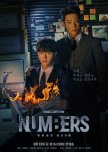
Don't be deterred by a supposedly dry accountants´ world. It´s feisty. Suspenseful. Emotional, too
"Numbers" is about auditors, balance sheets and accountants. It's obviously all about numbers. That may put some people off. It's also about what lies behind those numbers, and that may at times seem even more complicated to the uninitiated. However, deliberately illustrative examples are repeatedly interspersed. And it is even more gratifying that it is not necessary to understand all this in every detail in order to enjoy the series. “Numbers” is about a rational and clever mastermind. Yet it is also about having the heart at the right spot. It´s feisty. It´s also emotional. It stands up and means it. Great!"Numbers" is definitely worth it getting involved in the abstract world of accounting specialists. Especially since their decisions, in turn, have consequences for a world that juggles numbers even more aloof - Investment Fonds... While the auditors keep an eye on the current state of the balance sheet and put its potential through its paces, investors only care about future returns and often want the maximum profit regardless of the losses - which others have to bear for it.
Numbers are numbers. But the decisive factor is who has the sovereignty of interpretation. Numbers sound clean and objective, apparently. Yet, they stand for people, their visions and their decisions. Hidden underneath are solutions, too. As always, the question you´re asking, will make the difference – leading the way for your attention and focus. And as always, different possible perspectives exist. Also in the world of numbers.
"Numbers" is about a revenge campaign – again. There are actually several. It is about those who, with good reason, do not want to be intimidated by the power of the powerful – again. They have nothing (more) to lose. The bad guys are really bad. They have long lost their heart or never had one to begin with. This makes for plenty of interesting relationship dynamics.
"Numbers" also offers an interesting variety of intelligence and competence. Bottom line for revenge candidates – again: just on your own it is almost impossible to make a difference. However, someone courageously has to make a first clever and striking move ahead. With heart and soul. Then maybe others will remember that their heart was once in their right place, too. (In a rational, hierarchical world that takes for granted that there is no room for irrational emotions or personal interests, it's easy to forget just that.)
"Numbers" is a bold story about rather impure moves in the world of accounting and investment. A complex story. At the same time, an exciting, thrilling story that is fun, too. No matter how remote this world of dizzyingly high numbers may be for most of the audience, watching the story feels good overall. You get a high-flying, intelligent mixture. The actors show a strong presence in their roles and thus contribute a lot. The pace is right. OST fits fine.
My suggestion: don't be put off by suits, ties and a supposedly dry, conservative, number-dominated accountant business world. Sure enough, "Numbers" has it all!
------------------------------------------------------------------------
Side Note:
Banks in South Korea have been taboo for investors since the Asian crisis. For the bank sector, on the other hand, financial investment transactions are not permitted. Just now, in 2023, fundamental reforms were launched - some are even talking about a revolution. The banking sector is just now being opened up to new players in order to stimulate competition.
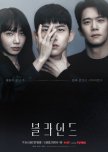
Exciting, yet gloomy thriller. The murder case being tried by a jury is just a kick off for more…
"Blind" is a fabulous, exciting, somewhat dark thriller."Blind" weaves its fictional story around 'survivors' of brutal child abuse and severely traumatizing exploitation as kids. These 'survivors' meet each other and their perpetrators 20 years later as adults. Each of those involved tried in his/her own way to come to terms with the past and lead a more or less normal life. Not only the abusive childhood, but also its psychological effects on their later life are a severe issue - and become a topic here. In addition, in this context complex interdependencies between the perpetrators of the time are dissolved and - against the background of a brutal variant of public vigilante justice - the original roles as perpetrators and victims are turned upside down.
"Blind" is haunting. The focus is on a murder case that is being tried by a jury. More murders follow. The dramaturgical setting is to some extent perhaps a bit reminiscent of an Agatha Christie novel - insofar as suddenly almost everyone in the case-related group of the selected jury could be the perpetrators... the distribution of roles between judges, investigators, victims and presumed suspects is also becoming increasingly opaque and fatefully intertwined. To pretend that one can turn a 'blind' eye to what used to be is no longer possible. Everyone must now look at the past and (even if it is perhaps a little late) bear the consequences. Magnificent.
----- SIDE NOTE: ---Child abuse - a sad and highly topical issue in South Korea ---
The thriller obviously saddles its story on the unspeakably sad topic of child abuse, which due to its unbroken topicality has increasingly made it into South Korea's series and film productions of recent years (among others "Children of Nobody" and "Mother" as drama or "Miss Baek" and "Bring me Home" as movie.) Many a well-established member of society prefer to look the other way when unbelievable deals are being made concerning minors, as long as they might even benefit themselves. And any 'survivors' can be glad if they manage to split off the traumatic experience to some extent - nevertheless most often PTS comes right along. Usually, those ´survivors´ until old age are psychologically still stuck in that desperate helplessness and inner agony of the past.
A South Korean government study from 2021 reveals, that abusive trafficking in minors has been rampant and even increasing in recent years. There is an acute need for action regarding more effective education in all public areas - from prevention to investigation and criminal prosecution up to employee training. A big problem with this: usually police officers or other officials are directly involved and work together with the traffickers, who specialize in the ruthless exploitation of minors. If the children and young people survive this, the psychological consequences of these deeply traumatizing experiences will be very hard - if at all - to be overcome. They are left helpless at the mercy of adults (who actually should take good care of them) and utterly hopeless in the face of a society that turns a blind eye to their torment. The only thing that is left: feeling betrayed and/or obviously of no worth whatsoever...
--------------------------
PS:
It may be that in reality a larger task force would have been set up to investigate the serial murders of the jury members. In my opinion, however, the KDrama didn't take anything away from keeping the circle compact in order to tell the story in its essential entanglements in a powerful way.
P.P.S.:
At last, I don't want to leave a pleasant detail (I think) unmentioned. We have seen it so often in KDramas: within the social ranking in South Korea, the older colleagues are obviously allowed to rebuke the younger ones with a shove, a kick or a snap on the forehead. (In view of my German socialization background, that is unheard of, but ...) In "Blind" one can now observe (among other things) that a transformation in this natural ranking behavior may be starting to happen within the younger generation: a colleague police officer in "Blind" actually gives back to his colleague and stands up for himself. So far, I have seen this rather rarely, if at all. Until now, as a rule in comparable situations, the fist usually remained in the pocket. In the mass consciousness, KDrama is relating to, starting 2022 such physical rebuke might obviously no longer be tolerated as a matter of course. Stand-up-for-your-rights seems to/wants to become possible - like a wind breeze of change coming up within a hierarchical tradition since centuries chiseled in stone...
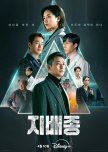
Crisp and tasty KDrama - revolving around some hot topics that one might rather want to call sci-fi
Intelligent, sharp, with strong characters. A crisp and tasty KDrama. “Blood Free” got me immediately - with an original hook, set within a gripping milieu, topped by thoughtful demeanor of interestingly authentic protagonists and splendid casting.Of course, the interfering natural interest of those in power (who obviously can never keep their hands off) is not at all surprising. Yet, the processing of some rather hot contemporary issues was presented in a refreshingly concise manner. Including topics that one might call a dream of the future... A bit far-fetched here and there? Perhaps. Nevertheless, often enough well grounded in common sense.
I assume there could as well be a second season... because the end doesn´t necessarily have to be the end, does it?
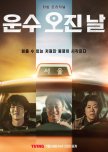
Absorbing & intense 500 minute road movie. A taxi ride to a soul´s nowhere. Brilliant from A-Z.
For me, “A Bloody Lucky Day” is one of the KDrama highlights of 2023.It is a psychological thriller. Without makeup. Set in a fairly grounded, solid, authentic everyday world, which gets challenged by a maniac´s incredible psychological logic. Stirring. Brilliant from A-Z.
However, everything revolves around the abysmal work of a psychopath. Accordingly, things get mercilessly brutal at times. The cumbersome police don't come off so well. Common sense, on the other hand, does... when it is in fact emotionally cornered to the extreme, so that it can no longer help but function at full speed, without distraction whatsoever.
One-pointed concentration, already having lost too much, getting your teeth into it and being ready to go to extremes – could that be the recipe to counteract the psychopathic 'monster'? Could... Maybe... Or not... Or is it?
“A Bloody Lucky Day” could be considered an absorbing ca. 500 minutes long road movie - a taxi ride to a soul´s nowhere. For the poor taxi driver a rather involuntary participant observation study on a psychopathic killer...
Emotionally highly explosive. Intense. Acting is first league. As a I mentioned earlier, a brilliant production from A to Z.
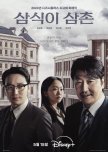
Great performance & complex narrative re. challenges in politics during dreary SK post-war decades
"Uncle Samsik" offers a quite interesting narrative of the complex connections between party politics and the even more crucial backroom politics during South Korea's first republic (1948-1960). The KDrama is primarily set in the run-up to the turbulent events and nationwide demonstrations that led to the resignation of the first President Rhee and the founding of the second republic. However, the nation that had hoped for real democracy and prosperity stumbled into a third one just three years later through a military coup. Although this brought the hoped for prosperity via totalitarian capitalism, it was still far from real democracy...The story of the KDrama is based on historical events, themes and people of that time, but is ultimately fictional - even if historical film sequences are occasionally interspersed as part of the April Revolution. The focus is on Uncle Samsik. For all those, who don't know much about South Korean history, Uncle Samsik is the emotional reference figure and dramaturgical bridge that holds all the politically complex threads together. Even without prior knowledge, "Uncle Samsik" offers an exciting, haunting political drama that takes place in the post-war years. It is in particular thanks to the passion of the great actors who manage to captivate the audience with comparatively 'dry' fare. It is advisable to watch the episodes consecutively so as not to lose the thread.
With a fictional plot the well-known historic events and what actually drove the political actors of that time are portrayed from different perspectives. Thus they are shown as multifaceted people with complex motives and stories. Political calculation becomes tangible through relationship dynamics and formative personal experiences. What created the conditions for that dictatorial regime and its totalitarian capitalism to torpedo South Korea into dazzling prosperity - the needs, hopes, ideals and concerns underlying the political actors - are being filled with life. And at the same time also what the young democracy still has to gnaw at today - authoritarian directive, opaquely networked and strictly hierarchically structured backroom politics.
The time in which the KDrama is set is marking the initial struggle to set the course for 'right' politics and a democratic political culture to start with. You have to keep in mind that Korea has not yet been able to gain much experience with modern, international politics and economic policy on the world market. Until the end of the 19th century, the Joseon Kingdom had isolated itself from the rest of the world and concentrated on itself. Western modernity and international influences increased during the early 20th century, especially while the Korean peninsula was a colony of Japan. The guidelines for political autonomy and independent parliamentary politics were only set in the course of the founding of the Republic of Korea as South Korea in 1948. And even then, the USA kept a close eye on the young republic. The people in South Korea had not yet been able to seriously experience themselves as political mature people of a democratic country... The south, by now isolated from its rich in raw material and industrially well developed north, was at that time one of the poorest agricultural countries in the world.
Uncle Samsik vividly depicts the conflicting feelings in the country. He represents the prevailing longing for wealth... or simply for three meals a day. Uncle Samsik's nickname already reflects what he stands for: sam (eum)sik = three meals. He (as a good uncle) grants this to his people. So actually this very basic human need was the top priority in those politically turbulent years. Hunger and poverty shaped everyday life for the many. Democracy as a political ideal may sound good, but it doesn't fill your stomach. Samsik cares about people. His political goal is to use all possible means to support those politicians who have a solid concept and can bring the country to a point where the people will soon have enough to eat. The way to get there: to consistently boost the economic power of the economically weak country (compared to the north) and thus create appropriately paid work whose salary is enough to provide for the families... even if that might imply that the people´s hope for true democracy still has to wait a bit longer...
So would I recommend "Uncle Samsik"?
Yes, but...
It's one of those things with historical dramas that deal with Korea´s recent post-war history (and with the KMovies about the first post-war decades, too... you have to want to see it. Colours, light, selection of protagonists - this is often enough inevitably not a treat. Colorful robes that were still common in Joseon times are rarely seen anymore. After the Japanese colonial period and at least since the influence of the USA in the wake of the Korean War, fashion has been completely westernized. This makes the production design comparatively rather dreary - dark suits, ties and plenty of scenes inside or in the dark. It is about scenes inside offices, hotel bars, conference rooms and bunkers instead of lushly planted palace gardens, picturesque bridges, colorful pavilions and pagodas, or the shaded, meditative palace walkways - it's all history. Politics by now happens behind closed doors. If suitable, it might sooner or later end up on the streets, too. Female characters with impact are also rare - gone are the lively days of palace ladies, servants and princesses, scheming dowagers and queens or spying gisaeng... Instead, there are lots of serious men in their (as I mentioned before) dark suits, preferably smoking and debating or giving orders in back rooms. Politics is a man's business - a power struggle that is eventually resolved with the help of thugs and cloak-and-dagger operations... (After all, women's power is at least trying to carve out some space in "Uncle Samsik"...)
In short, the setting is rather dark, complex, even complicated - and ties-heavy. Be aware.
Apart from that, "Uncle Samsik" is really well done. Vividly played and thematically differentiated, the KDrama brings those dreary, sobering post-war decades in South Korea to the international DisneyPlus audience, presenting it as a time that, despite all the prevailing corruption, arbitrariness and obedience to authority, was also characterized by a lot of idealistic passion and political hope. Once again, high-end historical drama à la KDrama...
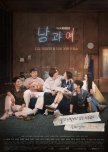
About a love that has somehow lost its suitability for everyday life over the years
“Between Him and Her” is an alternative to the tried and tested Cinderella love story, which usually ends with a supposedly “they lived together happily ever after”. Therefore, this story is about 7 years later...The KDrama is rather down-to-earth. It is set within the world of young creatives of Seoul´s fashion scene and tells about a love that has somehow lost its suitability for everyday life over the years. A love that became a habit.
Eventually, a critical moment causes the barrel of internal, unnamed, silent, consuming dissatisfaction to overflow and thus gives necessary strength to actually question everything. However, questioning everything also means having to ask yourself the unpleasant questions. Unfortunately, the answers are not clearly “yes” or “no”. They´re lurking subtly, are not always logical, nor pragmatic or even negotiable. Sometimes it's a "Yes. But." Sometimes it's a "No. But." The problem is: whether it's "yes" or "no", both are true. Love is not always automatically suitable for a partnership... and even if so, this cannot be considered a given either. Nevertheless, that doesn't make such a love any less true or valuable.
For outsiders, on the other hand, the matter may seem more evident. As a audience, we might want to shake one or the other. But in the end the answer unfolds exclusively from within the very personal, complicated emotional world of him and her. Nobody else can have a say. And the KDrama conveys that quite vividly, rather authentic and painfully realistic, too.
Accordingly, the pacing as the two protagonists are taking stock of their emotional relationship, is rather cautious and introspective. Therefore, subplots are providing some invigorating comedy and a bit of drama on the outside, thus pleasantly topping off this little study on certain facets about love.
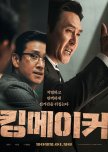
Political thriller, eloquently dealing with SK´s struggle for true democracy. Inspired. Profound.
Election campaign is a fight. But what rules should be applied? Do you inevitably have to hand in your ideals and ethics at the entrance as price for political success?Critical processing of South Korea's recent past - the democracy movement - is still in its infancy, because the dictatorship just finished a few decades ago and its proven structures within conservative circles are still resonating today. Increasingly, however, this topic is also taking up its media space. The political thriller "Kingmaker" sets a bold milestone by taking on a dazzling, comparatively upright, almost exemplary political personality, who for a long time seemed to have no chance in his sincere, ambitious fight for real democracy: Kim Dae-jung. He was the first opposition candidate to be elected President of the Republic. He is also the only South Korean to ever receive a Nobel Prize for his work on democracy and human rights. Some call him the Nelson Mandela of Asia...
In particular "Kingmaker" tells (in the plot prepared with some poetic freedom) about the early years of his political struggle and the arduous path that ultimately led him to the Blue House. The focus is less on his biography and more on what he still stands for in the eyes of most South Koreans today: real democracy. Or rather, against what he wanted to compete: the conservative, elitist, political cronies who stand in the way of progress and justice, if it is not in their own interest.
In the service of the electoral success, Kim (like so many politicians on this planet) was probably tried more than once to sanctify the 'good' purpose in the sights of many a morally questionable means. This difficult balancing act between an upright political attitude and one's own venality in a pact with a promising "devil" is illuminated and processed here in an impressive way. The temptation of a promising shortcut to success usually comes with a price that has to be paid sooner or later. (The internal struggle of 'for' versus 'against' shapes the decision-makers in South Korea with their well-established, conservative, shadowy networks to this day. This is actually writing daily history. And the TV and movie productions are full of it, too.)
The status quo - submission to the apparently influential 'more powerful' - is contrasted with a historically real personality. In order to convey the emotional dilemma in a dramaturgically clear way, Kim's campaign strategist of the first hours, Eom Chang-rok, was stylized as the main character and staged fictionally. In fact, little is known about him other than that he is said to have been brilliant and downright genius.
The story is about Eom Chang-rok's intelligent crisis interventions, solution approaches and election campaign strategies, some of which are in stark contrast to Kim's idealistic democratic values, that are always geared towards serving the people. The audience is confronted more than once with the question of whether the end might justify the means. Isn't the power of the people just a well-meant illusion after all? Wouldn't it be more efficient for the state leadership if a few (more or less) smart people decided for the many others in a short decision-making process? "Kingmaker" touches the foundations of political morality and ideology.
However, the KMovie also touches on very human weaknesses: the need for approval and the temptation to be seduced. These weaknesses are truly human and have to be dealt with by everybody - somehow, someday.
"Kingmaker" is a moving political thriller set in recent South Korean contemporary history about the stumbling blocks and challenges of true democracy. A democracy, that requires responsible, mature and accountable citizens. A democracy, that will always be challenged by the forces and networks operating in the shadows, whose goal is to incapacitate the citizens and instead rule for their own personal benefits.
An unpleasant subject, indeed. Yet the KMovie is eloquently dealing with this crucial issue for any democratic society.
A brilliant approach to this topic as well as to a younger chapter of South Korea´s history.
Inspired storytelling.
A profound production.
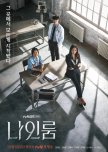
I consider the acting performance in "Room No. 9" as it´s true highlight
Another KDrama about revenge? Not quite. Ok, it´s about injustice done in the past. Yet, it´s rather about the desire for official recognition of innocence, let alone the unjust verdict - as reconciliation with fate. Revenge is secondary. I would say, that is good news. The protagonist is more concerned with her own peace of mind than primarily with new suffering that she in turn has to inflict on her perpetrator. She doesn't want to keep turning the wheel of fate, she wants to stop it.Yet once again, being stuck in the past is a driving force: in this case, the protagonist sits in prison awaiting execution - for decades. ----- SIDE NOTE: South Korea has in practice stopped using the death penalty, but all legislative initiatives to officially abolish the death penalty (most recently in 2019) have so far failed.
Dramaturgic maneuver with magical components: a body swap. The motif is not new to KDrama. Although the personalities in the body are now different, the bodies themselves still have their cellular memories plus the environment inevitably remembers the person originally owning this body. So there is lots of room for funny situations - although they are always solved humorously, they are not slipping into farce. The story is serious and touching, but also playfully told. Laughter is allowed. A teardrop here and there, too.
I consider the acting performance in "Room No. 9" as it´s true highlight: Kim Hee-sun and Kim Hae-sook manage brilliantly to unite the characteristic aura of the other and thus perfectly embody the switch. They are marvelous to watch. And it's a pleasure to see the experience in the body of the other person has a transforming effect becoming a new (cellular) memory...
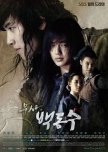
Epic and action are by a humorous ribbon tied together in a touching, gripping way. Go for it!
Set in a jaunty kaleidoscope of relationships, friendships, brothers in arms, blood ties, loyalty, heroism and heartbreak, the time of King Yeongjo, Crown Prince Sado and King Jeongjo is epicly (for a 2011 series production) portrayed."Warrior Baek Dong Soo" is full of fun, martial arts and of course: drama. There is politics, too, yes, butteh KDrama is definitely more on the drama and action side. I benevolently ignored some daring storytelling details and the selectively very optimistic choreographic freedom in the heroic staging. "Warrior Baek Dong Soo" balances between history and entertainment, between epic scope and personal tragedy, between deep, dramatic emotionality and airy, playful, humorous, good mood. The KDrama finds a rousing swell, in which the emotional waves are allowed to splash from all directions - with a story that sails between historically memorable facts, legendary heroes, steep (but by no means absurd) hypotheses, and colorful dramaturgical freedom. It offers great entertainment thanks to an exceptionally strong presence of all actors - whether young or old.
Baek Dong-soo himself is wonderfully portrayed by Yoo Jin-goo (young) and Ji Chang-wook (adult) in the sense of a largely impulsive jester who wears his heart on his sleeve. On the other hand, there is the introverted, somehow tragic, always serious and withdrawn Yeo Woon (Yoo Seung-ho as an adult and Park Gun-woo as a boy). The demanding life of the young warriors is sweetened by the unique charms of Hwang Jin-joo (cheeky, tomboyish: Yoon So-yi) and Yoo Ji-sun (stoic, reserved: Shin Hyun-bin). The by now veteran acting legend Choi Min-su as assassin lord in gothic style gives his very personal flavor throughout the 29-episodes long ride through time. And quite a few more there are.
In this KDrama it is rather the dramatic love story and love triangle of the older generation that pushes itself emotionally to the fore than that of the younger generation. This is probably due to the fact that Baek Dong-soo's generation is more dominated by humor and a cheeky mouth that wants to take on fate, while the older generation is dominated by the decades-long heavy burden of overwhelming life experience.
The historical hook of "Warrior Baek Dong Soo" is (as the title suggests) Baek Dong-soo, who went down in history as a heroic swordsman legend. He was one of three authors of the 'Muye Dobo Tongji' (= Illustrated Manual of Martial Arts), which is now officially classified World Heritage. This four-volume work summarizes the common weapon techniques of the Joseon period. (The book gained its extraordinary importance as a rare, valuable historical source on military affairs and Joseon martial arts, since older works fell victim to the destructive Qing invasions from the north.) However, swordsman Back Dong-soo first of all became legendary because he repeatedly saved King Jeongjo from being assassinated. And this juxtaposition of swordsmen serving the king versus assassins serving a however motivated client, originally inspired the 2010 KDrama comic entitled Honorable Back-Dong-soo.
The KDrama "Warrior Baek Dong Soo" thus also contrasts swordsmen and assassins - in terms of their ethics, their loyalty, their code, their mission, their training, their emotional world. This ambivalent and tragic dynamic makes the 29 episodes going and the time spent watching it worthwhile. They are so similar and yet they are worlds apart. One has to protect, the other has to kill. And yet, he who kills also protects. And yet, he who protects also kills. Both are henchmen. Both give everything. Risk everything. They're simply on different sides. Depending on the situation, the act of the swordsman is considered correct and honorable, while that of the assassin is considered a crime and vile. In my opinion, the KDrama reveals one of its strongest moments in the emotional explosiveness of the fatal bond between the first swordsman and the leading assassin lord (each of their own generation). They are so close emotionally and yet they live in different worlds: One in the light open, the other in secret. In tried and tested KDrama manner, the 'bad guys' (assassins) once again - despite the concentrated ambivalence of their characters - play their way taciturnly, but effectively into the hearts of the audience.
The framework for the plot is in beautiful continuity provided by sword fights and political intrigues. The flesh is made of fatal, ambivalent, intense relationship ties and feuds between the protagonists. History sets the direction. Epic and action are by a humorous ribbon tied together in a touching, gripping way. Go for it!
---------------------------------------------------------
Historical SIDE NOTE: --- Yangban of Joseon in the 18th century between conservative thinking and reformist, modern impulses. ---
The historical background of KDrama is shaped by three memorable decendants of the Joseon Dynasty. King Yeongjo, who holds the record-breaking 52-year reign on the throne, Crown Prince Sado, who went down in history as a tragic, possibly greatly misunderstood figure, and his son, who contributed to peace and prosperity as King Jeongjo. In addition to the serious efforts of the two kings for stability and progress, there are the divided camps among the nobles who fight by all means for their supremacy in political and social affairs.
Between 1674 and 1689 the Namin (Easterners) steered the administration of the country in their interests, followed by the Seoin (Westerners), who then entangled their position of power in disputes: the Noron representing the old, strict, conservative neo-Confucian doctrine and the Soron fighting for a new, modern, reformist, practice-oriented doctrine (Sirhak). It was probably King Yeongju's merit that despite the massive differences, the balance of power between the camps was well balanced for a long time. However, the price he had to pay for reasonably stable living conditions in the empire was his son, Crown Prince Sado, who favoured modern teaching and thus provoked the Noron. At least that is how one historical theory interprets the dramatic events surrounding Sado, who is said to have died locked in a box. The KDrama follows this theory (and not the annals, that present Sado as falling into insanity that could no longer be curbed, or a third theory that suspects a massive father-son conflict as the cause).
So, in line with the theory, which sees Sado as a progressive, reformist spirit, who wants to liberate his country from the supremacy of the Qing, "Warrior Baek Dong Soo" tells the story of the loyal followers of the ruling family, who are skilled in martial arts, and how King Jeongjo wants to live up to his father's modern visions. In doing so, with an open attitude the young king, too, always chose a balance and thus continued the proven political strategy of his grandfather, who in doing was able to stay alive more than half a century. In this way, King Jeongjo succeeded in the 24 years of his reign between 1776 and 1800 in building the Hwaseong Fortress as the center of his reign, in advancing education and science, in optimizing national defense and in creating the Royal National Library of Gyujanggak. However, he could never be sure of his life... at least seven assassination attempts alone during his first year in power are historically recorded. ... A striking reflection of the massive resistance against the attempted modernization of thinking in Yangban circles.
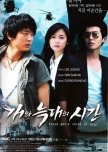
A spy drama right from the start
"Time between Dog and Wolf" is a KDrama from 2007. But don't worry, the series still knows how to grip today. (I don´t even dare to imagine what a terrific spectacle the KDrama would be, if it would come along in the style of 2020 KDrama cinematography...)The story starts - as so often back then - with the childhood days, e.g. the small and big traumata from that time. The entanglements are laid out and there's a lot in it Makjang-wise. However, it is not your typical makjang, The story is exciting, has a good pace and the shadowed complexity makes it difficult to see through. "Time between Dog and Wolf" is a spy drama right from the start and leaves hardly anything out.
The title sums it up quite well. Actually, this refers to the Latin metaphor "Inter Canem et Lupum" - between dog and wolf. In the evening twilight it is difficult to distinguish, so to speak, whether a wolf or a dog is standing in front of you, although you can just about make out that it will be one or the other. It's not pitch black yet.
However, this expression does not only refer to the twilight, but also contains another metaphorical allusion: This is the time when the wolf goes hunting and the dog seeks its bed... Who stands before me, though? Can I trust?
Thus the 16 episodes consistently maintain their twilight... Wolves (mainly) and dogs (a few) cross paths. Sniff each other. Fight each other. Join together to form a pack. Are hunted and hunt. Give themselves away. Make up for it. The one. The other. And others again. On top of all that, love puts plenty of salt into the wounds.
Ultimately, the symbol is even suitable for this KDrama in a third respect. In addition to the topics 'distrust/deceit', 'hunter/hunted', there is also the fact that both dogs and wolves are extremely social pack animals...
This is a KDrama that has a lot to offer in terms of exciting and moving entertainment. Lee Joon-gi shows edge here even at his younger age. But all of them express their emotions with some intensity. This does not go bye unnoticed.
The fact that a considerable part of the action takes place in Thailand also brings unexpected exoticism into the scene, which doesn't hurt.


 9
9 39
39 15
15















